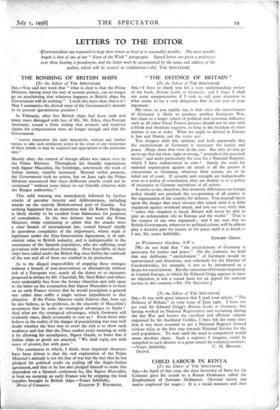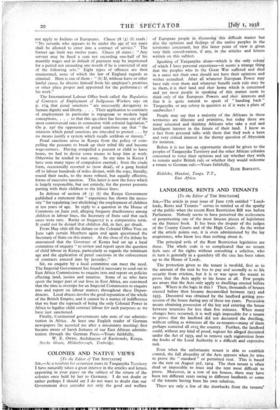CHILD LABOUR IN KENYA
[To the Editor of THE SPECTATOR] SIR,—In April of this year, the then Secretary of State for the Colonies gave his assent to a Kenya Ordinance called the Employment of Servants Ordinance. (Servant means any native employed for wages.) It is a racial measure and does not apply to Indians or Europeans. Clause 28 (3) (b) reads: " No juvenile who appears to be under the age of ten years shall be allowed to enter into a contract of service." .The former age limit was twelve years. Clause 58 states : " Any servant may be fined a sum not exceeding one-half of his monthly wages and in default of payment may be imprisoned for a period not exceeding one month if he is convicted of any of the following acts." Eight types of offences are then enumerated, none of which the law of England regards as criminal. Here is one of them : " (b) If, without leave or other lawful cause, he absents himself from his employer's premises or other place proper and appointed for the performar_c! of his work."
The International Labour Office book called the Regulation of Contracts of Employment of Indigenous Workers says on p. 174, that penal sanctions are necessarily derogatory to human dignity and liberty. . . . Their application to contracts of employment in particular is repugnant to modern legal conceptions, . . . so that this question has become one of the most controversial ones in connexion with colonial legislation." On p. 197 the opponents of penal sanctions say that " the interests which penal sanctions are intended to protect . . . by no means justify a system which recalls serfdom or slavery."
Penal sanctions arose in Kenya from the policy of corn-. pelling the peasants to break up their tribal life and become wage-earners. Having compelled a peasant or child to leave home, we had to devise some means to keep him at work. Otherwise he tended to run away. In my time in Kenya I have seen many types of compulsion exerted ; from the crude form, occasionally resorted to (now dead), of a gang hauled off to labour hundreds of miles distant, with the rope, literally, round their necks, to the more refined, but equally effective, forms of excessive taxation. This latter is now the force which is largely responsible, but not entirely, for the poorer peasants parting with their children to the labour lines.
In defence of section 28 (3) (b) the Kenya Government published a statement that " experience has shown the neces- sity " for regulating (not abplishing) the employment of children at ten years of age. In reply to a question in the House of Commons on June 2nd, alleging frequent drunkenness among children in labour lines, the Secretary of State said that such cases were rare. Rarity or frequency is a comparative term. It could not be denied that children did, in fact, get drunk.
From May 16th till the debate on the Colonial Office Vote on June 14th certain Members again and again questioned the Secretary of State on this matter. At the close of the debate he announced that the Governor of Kenya had set up a local committee of enquiry " to review-and report upon the question of child labour in Kenya, particularly as regards the minimum age and the application of penal sanctions in the enforcement of contracts entered into by juveniles."
Sir, no enquiry by a local committee can meet the need. The Imperial Government has found it necessary to send out to East Africa Commissions to enquire into and report on policies affecting Jand, justice and taxation. Some of us who have spent the larger part of our lives in East Africa, are convinced that the time is overripe for an Imperial Commission to enquire into and report on labour matters throughout. these Depen- dencies. Local abuses involve the good reputation of the whole of the British Empire, and it cannot be a matter of indifference that we bear the reproach of being the only Colonial Power in Africa to legalise child contract labour for such purposes as we have just sanctioned.
Finally, Continental governments take note of our adminis- tration in Africa. At least one English reader of German newspapers (he accosted me after a missionary meeting) first became aware of harsh features of our East African adminis- tration through the German Press.=Yours faithfully,



















































 Previous page
Previous page